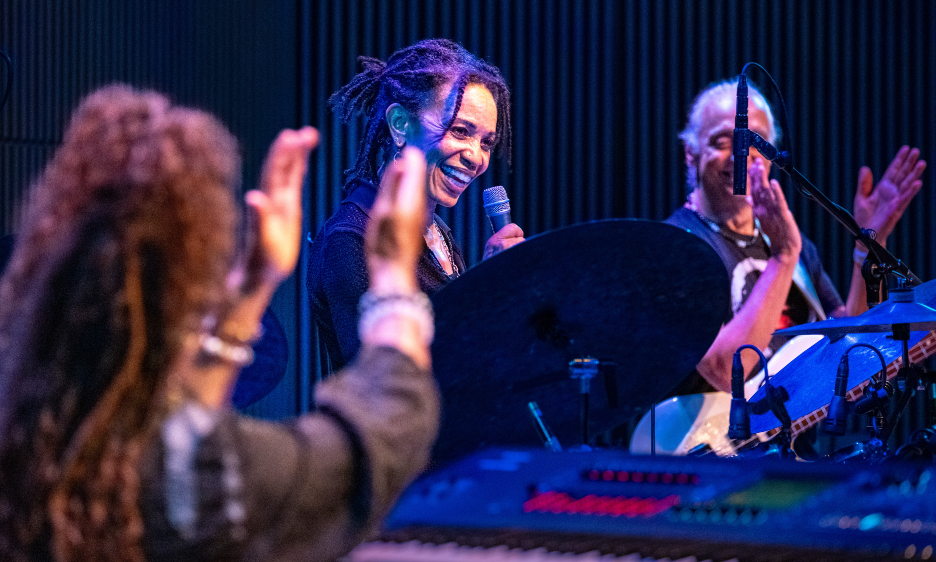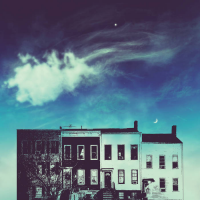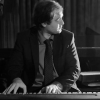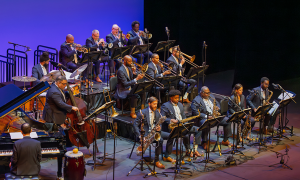Home » Jazz Articles » Live Review » Cindy Blackman Santana Band at Miner Auditorium
Cindy Blackman Santana Band at Miner Auditorium

Courtesy Steve Roby
On the second of two sold-out nights at Miner Auditorium, Cindy Blackman Santana opened with a brief welcome—"Blue Whale"—and nothing more. The band turned toward the center, eyes on her for the first cue, as if to agree that rhythm would set the terms. In a time when talk can crowd the stage, she let intent arrive in time and tone, not explanation. In an era when stage patter often substitutes for purpose, Blackman Santana let intent speak in rhythm.
What followed was less a recital than a reminder: music still earns its authority through the act of playing. Ravi Coltrane, alert and ready, rose to his toes and bent a knee to squeeze a sharp cry from the horn, then slipped to the back line. Aurelien Budynek responded with serrated, effects-streaked guitar; Patrice Rushen swelled the organ and, when the space opened, unfolded a line that smiled without softening. Bassist Benny Rietveld kept the floor moving, not as ballast but as conversation. Everyone but Coltrane faced center stage, watching Blackman Santana for cues, and for the first hour—six instrumentals, no announcements—that unspoken democracy created a tight, human focus. There is trust in that sight line. There is accountability, too.
Blackman Santana has followed this ethic since childhood: playing drums at seven, jazz at thirteen, her ears opened wide by Max Roach and then expanded by a Tony Williams clinic that redefined what the instrument could demand. You could hear that lineage tonight: not imitation, but the way a life absorbs its elders and keeps moving forward. The band featured a mix of jazz, jazz-rock fusion, funk, and blues—a continuum stretching from Roach to Williams to today, from tight-knit bands in small rooms to arenas and back again.
"Blue Whale," composed by Budynek, embodies a first principle—an assertion that groove is a way of thinking. From there, the set moved through "Circe," "Music," and "Sunday Sunrise" (from the Bernie Worrell, Cindy Blackman Santana, and John King, 2023 album Spherical—Infrequent Seams, 2023), each piece offering a different perspective on fluency. Coltrane and Budynek traded phrases like neighbors on stoops, neither trying to win, both aiming to clarify. Rushen, selective with her spotlights, chose her moments carefully and made them count, sometimes with gospel influence, sometimes with city steel. Blackman Santana's five-minute solo was less about showmanship than testimony: rolls like weather bands, cymbals that did not crash so much as reason, a left hand that wrote its own grammar while the right-hand kept time honestly.
Somewhere amid that first hour, Blackman Santana told us this weekend was the first time this band had ever played this music. That admission—risk as a principle, not a stunt—gave the night its inner plot. In a marketplace that often rewards polish over courage, here was an artist betting on live discovery. There was a moral in that.
When Blackman Santana finally retook the mic, it was to yield the room to family and history. "This guy is no new face here in the Bay Area," she said, teasing and proud. "So, I'm only going to say his name, and you guys can do what you do—Carlos Santana!" The roar was instantaneous, affectionate; a woman near the aisle shouted "Amen!" before her hands even came down. Santana strode out in a white fedora and a pale-colored top, sun-embroidered across the back, bright orange pants broadcasting the joy he would soon confirm. He sat on a drum stool beside a small table bearing a photo of Sri Chinmoy and a bottle of Fiji water, then addressed the house with the mixture of candor and uplift that has long been his signature. "I want to thank you from the center of my heart for being here," he began, before pushing past pleasantries into a plea: reject "stupid shit" and fear; remember we are "a beam of light that comes from the mind of God." It was not so much a sermon as a summons to attention, and Miner answered with hoots, applause, and a quieting that made the first notes feel like a reply.
"Sanctuary" opened the second chapter with Wayne Shorter's name hovering in the air—Santana honoring him in spirit and in grit, even slipping into a John Lee Hooker—style riff that pulled blues authority up through the floorboards. On "Capri," the band dropped into a deep bluesy rock-and-boogie pocket; fireworks flickered across the screen above them while the bass bounced and Coltrane—switching to alto—ripped a concise, upward-leaning jam before stepping back for Santana's long, sustained cry. Rushen found a greasy figure, the kind that widens your stance, and Budynek flickered in the margins like a matchhead.
"Afro Blue/Dangerous" fused tradition and the pop present with no apology: Mongo Santamaria's standard as the corridor, Michael Jackson's "Dangerous" as the unexpected room at the end of it. Blackman Santana's kick drum turned declarative, the beat grew rock-leaning without losing logic, and Santana clapped the audience into time until the room became an instrument. Rushen laid down a deep-boogie keyboard vamp; Rietveld plucked and prowled. Coltrane took off, returned, took off again. When Santana landed another solo—a clean, singing arc—the cheers felt less like approval than recognition. "How's that for a special guest?" Blackman Santana asked, laughing into the roar.
For the encore, Santana invited the room to sing the words that anchored the night's ethic. "A Love Supreme," he called, adding "supreme, supreme," and Miner obliged—a congregation without doctrine, praising the courage of sound. In the aisles, a fan tried to approach the stage with a Zebop! (Columbia, 1981) LP and a Sharpie; Security, doing their job, turned her back, but the impulse told its own story—some music you want to take home in your hands.
A fan in the lobby, flushed and smiling, said, "I feel like I just had the richest meal I've ever eaten!" That felt like testimony from the jury that matters. Because what lingered after the last cymbal shimmer was not velocity or even star power, but character. Blackman Santana has spent a life insisting that the drums can argue, console, provoke, and bless. She has been an anchor in pop and a catalyst in post-bop, has honored Tony Williams with the Lifetime tribute band Spectrum Road, has poured herself into Santana's Sentient (Candid Recordings, 2025), and is finishing a solo project—Coherence, already represented by a track featuring Santana—that promises less a victory lap than another line drawn forward. Tonight, she led a band that did not hide behind polish; she showed us risk as hospitality, welcomed an elder who still believes in healing, and trusted a room to hear the difference.
What is the state of the scene? If you only look at charts and algorithms, you might miss it. But in places like Miner, where musicians still turn toward the drummer to see what the truth demands next, the stream flows on. It widens, bends, catches new rain, carries old stones. Cindy Blackman Santana stands mid-river, unwavering, asking the music to matter. She plays that question like a vow, and the answer—human, stubborn, luminous—comes back in time.
Setlist
"Blue Whale," "Circe," "Music," "Sunday Sunrise," "Peace Please," "Curiosity." Cindy Blackman Santana Band w/Carlos Santana Setlist: "Sanctuary," "Capri," "One on One," and "Afro Blue/Dangerous." Encore: "A Love Supreme."Tags
Live Review
Cindy Blackman Santana
Steven Roby
United States
California
san francisco
Aurelien Budynek
Patrice Rushen
Benny Rietveld
Max Roach
Tony Williams
Bernie Worrell
John King
Carlos Santana
Wayne Shorter
PREVIOUS / NEXT
Support All About Jazz
 All About Jazz has been a pillar of jazz since 1995, championing it as an art form and, more importantly, supporting the musicians who make it. Our enduring commitment has made "AAJ" one of the most culturally important websites of its kind, read by hundreds of thousands of fans, musicians and industry figures every month.
All About Jazz has been a pillar of jazz since 1995, championing it as an art form and, more importantly, supporting the musicians who make it. Our enduring commitment has made "AAJ" one of the most culturally important websites of its kind, read by hundreds of thousands of fans, musicians and industry figures every month.































